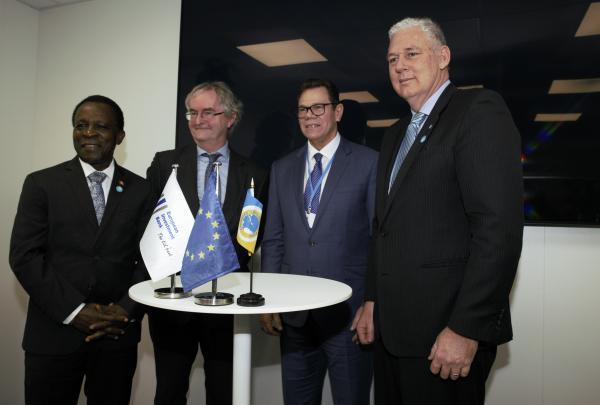
The European Investment Bank (EIB) and the Caribbean Development Bank (CDB) have set up an emergency post-disaster reconstruction financing initiative to help the Region recover from recent hurricane events.
The arrangement will support investments for infrastructure reconstruction projects in the Caribbean in the wake of the recent hurricanes. The new USD 24 million financing package is an addition to the USD 120 million Climate Action Framework Loan II signed in May this year, and which remains the EIB’s biggest loan to the Caribbean.
Eligible investments under the new loan will include infrastructure reconstruction, with a focus on “building back better” and integrating climate risk and vulnerability assessments into the projects. This will help reduce the Bank’s Borrowing Member Countries’ vulnerability to future natural disasters and worsening climate change impacts. As well as infrastructure, financing to communities for low-carbon and climate-resilience measures such as improved water resource management are also foreseen.
CDB President Wm. Warren Smith and EIB Vice President responsible for Climate Action, Jonathan Taylor, signed the new agreement during the UN Climate Change Conference (COP 23) in Bonn, Germany. Small Island Developing States is a key theme for the event this year under the Fijian Presidency. Against this backdrop, CDB and EIB presented innovative solutions to climate challenges during an event focusing on climate action in the Caribbean, attended by the Prime Minister of Grenada, Dr. the Rt. Hon. Keith Mitchell, Prime Minister of Saint Lucia, Hon. Allen Chastanet and other stakeholders.
Jonathan Taylor, EIB Vice President said: “In response to the devastation caused by hurricanes in the region in recent weeks, the EIB and CDB rapidly agreed to commit additional resources to support reconstruction investment projects in the Caribbean. The USD 24 million post-hurricane reconstruction initiative comes in addition to the USD 120 million loan to CDB for financing climate change mitigation, adaptation and resilience projects which we signed earlier this year. We stand committed to developing our fruitful 40 year partnership with CDB, to support climate-resilient projects in the Caribbean and to help to adequately tackle the challenges related to climate change. ”
CDB President Wm. Warren Smith said: “The 2017 hurricane season was one of the most devastating the Caribbean has ever experienced, and underscored the urgent need for investment in climate-resilient infrastructure in our region. The signing of this agreement is another milestone in our longstanding partnership with EIB, and will facilitate CDB’s increased support for resilient reconstruction in the Caribbean. We remain committed to work with our partners to mobilise resources needed to ‘build back better’ and, despite the recent setbacks, help the most vulnerable countries of our region to remain focused on meeting their goals for sustainable development.”
To date, CDB has committed all of the resources under the first Climate Action Line of Credit - USD 65.6 million - for seven projects. This co-financing is associated with total project financing of USD 191 million.
Since CDB’s Climate Resilience Strategy was approved in 2012, 58% of projects financed have included climate change adaptation and/or mitigation elements in the climate-sensitive sectors of water, education, agriculture, and physical infrastructure such as sea defences, drainage, and roads. Using the Joint Multilateral Development Bank Methodology, climate financing represented 13% of total CDB project financing in 2015. In 2016, CDB approved USD 50 million for projects with explicit climate resilience and sustainable energy actions.
A pipeline of climate action projects amounting to over USD 300 million and which may be eligible for funding from this new loan has been developed with financing of an EIB-funded technical assistance programme.
The EIB has supported development and economic activity in the Caribbean with loans and equity investment worth EUR 1.6 billion (bn). The EIB is the world’s largest multilateral financier of climate action with EUR 19 billion of lending for this sector in 2016, including EUR 1.9 bn targeted at developing countries.
Notes to editors:
The European Investment Bank, the European Union’s long-term lending institution, is committed to supporting implementation of the Paris Climate Agreement and backing climate related investment around the world.
The EIB, active in more than 130 countries, is the world’s largest financier of climate related investment and largest single issuer of green bonds. A quarter of all EIB financing supports climate action and the EIB is committed to providing USD 100 billion for climate related investment in the five years up to 2020.
At COP 23 in Bonn, EIB climate experts and senior management will highlight the EIB’s broad support for climate investment in diverse sectors, announcing a number of new policy initiatives and project investments. A regularly updated agenda of EIB events and contacts can be found here:
http://www.eib.org/infocentre/events/all/eib-at-cop-23.htm
The Caribbean Development Bank is a regional financial institution established in 1970 for the purpose of contributing to the harmonious economic growth and development of its Borrowing Member Countries (BMCs). In addition to the 19 BMCs, CDB’s membership includes four regional non-borrowing members – Brazil, Colombia, Mexico and Venezuela and five non-regional, non-borrowing members; i.e., Canada, China, Germany, Italy, and the United Kingdom. CDB’s total assets as at December 31, 2016 are USD2.89 billion (bn). These include USD1.59 bn of Ordinary Capital Resources and USD1.29 bn of Special Funds. The Bank is rated Aa1 Stable with Moody’s and AA+ Stable with Standard and Poor’s and Fitch. Read more at caribank.org.

